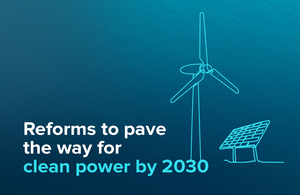Essential reforms to pave the way for clean power by 2030
Ambitious reforms to the government’s flagship renewables scheme will pave way for more projects to come online for clean power 2030 – helping build an energy system that can bring down bills for households and businesses for good.

- Government sets out proposals that pave the way for more homegrown, clean energy projects in the UK
- consultation on flagship Contracts for Difference scheme includes proposals to remove planning barriers, bringing clean power online faster
- changes ensure auction remains fit for purpose and drives investment and growth, enabling government’s mission for clean power 2030 as part of Plan for Change
Building on the success of last year’s AR6 round, which delivered a record-breaking 128 projects with 9.6 GW of capacity – enough to power around 11 million homes – the government is today (Friday 21 February) consulting on proposals to provide greater certainty to investors and a better deal for consumers, including:
- relaxing the eligibility criteria on planning consent for fixed-bottom offshore wind, helping to speed up new offshore wind farms coming
- changing how offshore wind budgets are set and published, enabling funding to be invested more efficiently
- increasing the Contracts for Difference contract term beyond the current 15 years, making renewables contracts more cost effective
The UK is already home to the 3 largest operational offshore wind farm projects in the world, but the UK must secure even more to deliver clean power by 2030. Today’s reforms set out plans to secure the additional offshore wind the UK needs at a good price, delivering value for money to UK bill-payers.
Electricity generated by renewables will be the backbone of the clean power system by 2030, and the Contracts for Difference scheme is vital to deploying enough renewables that will deliver the capacity targets set out in the Clean Power 2030 Action Plan. This will get the UK off the rollercoaster of global fossil fuel markets while creating good jobs and driving economic growth.
The UK already has 30.7 GW of offshore wind either installed or committed, with a further 7.2 GW of capacity consented, against a target capacity range of 43 to 50 GW needed for clean power by 2030. These reforms will enable the UK to go further and faster to secure its position as a clean energy superpower.
Energy Secretary Ed Miliband said:
Last year, we celebrated delivering the most successful auction round in history – now we want to go even further.
British families and businesses are bearing the cost of the reliance on petrostates and dictators who set the price of gas on the global market.
Our bold new reforms will give developers the certainty they need to build clean energy in the UK, supporting our mission to become a clean energy superpower and bring down bills for good.
Neil McDermott, Chief Executive Officer of LCCC, said:
The CfD scheme has been instrumental in delivering low-carbon electricity to date. As we move towards the government’s 2030 Clean Power target, the CfD will play an even more significant role, maintaining GB’s position as a global leader in renewable energy.
The proposed changes outlined in the consultation published today include the repowering of existing onshore wind sites, enable floating offshore wind to scale up through phased CfDs and increasing the CfD contract term beyond the current 15 years.
Maintaining investor confidence is crucial to delivering Clean Power by 2030 and LCCC remains committed to ensuring any changes are implemented smoothly, helping to unlock further private investment in the sector.
These proposals are the latest actions taken by the government to deliver clean power by 2030 and support growth. The government announced the launch of the Clean Industry Bonus, incentivising offshore wind developers to invest in cleaner supply chains and create jobs in industrial communities.
The consultation on reforms to the Contracts for Difference scheme is open for 4 weeks until 21 March, with a government response expected ahead of the AR7 round.
Notes to editors
Full list of proposed reforms being consulted on include:
- relaxation of eligibility criteria on planning consent for fixed-bottom offshore wind
- changes to the way budgets for offshore wind are set and published, including allowing the government to view bid information in anonymised form
- increasing the CfD contract term beyond the current 15 years
- enabling CfD support for repowered onshore wind projects
- extending phasing to floating offshore wind (FLOW) projects
- increase the Target Commissioning Window (TCW) for solar projects from 3 to 6 months
- removing the ability of existing CfD generators to apply surrendered capacity from previous allocations rounds into AR7